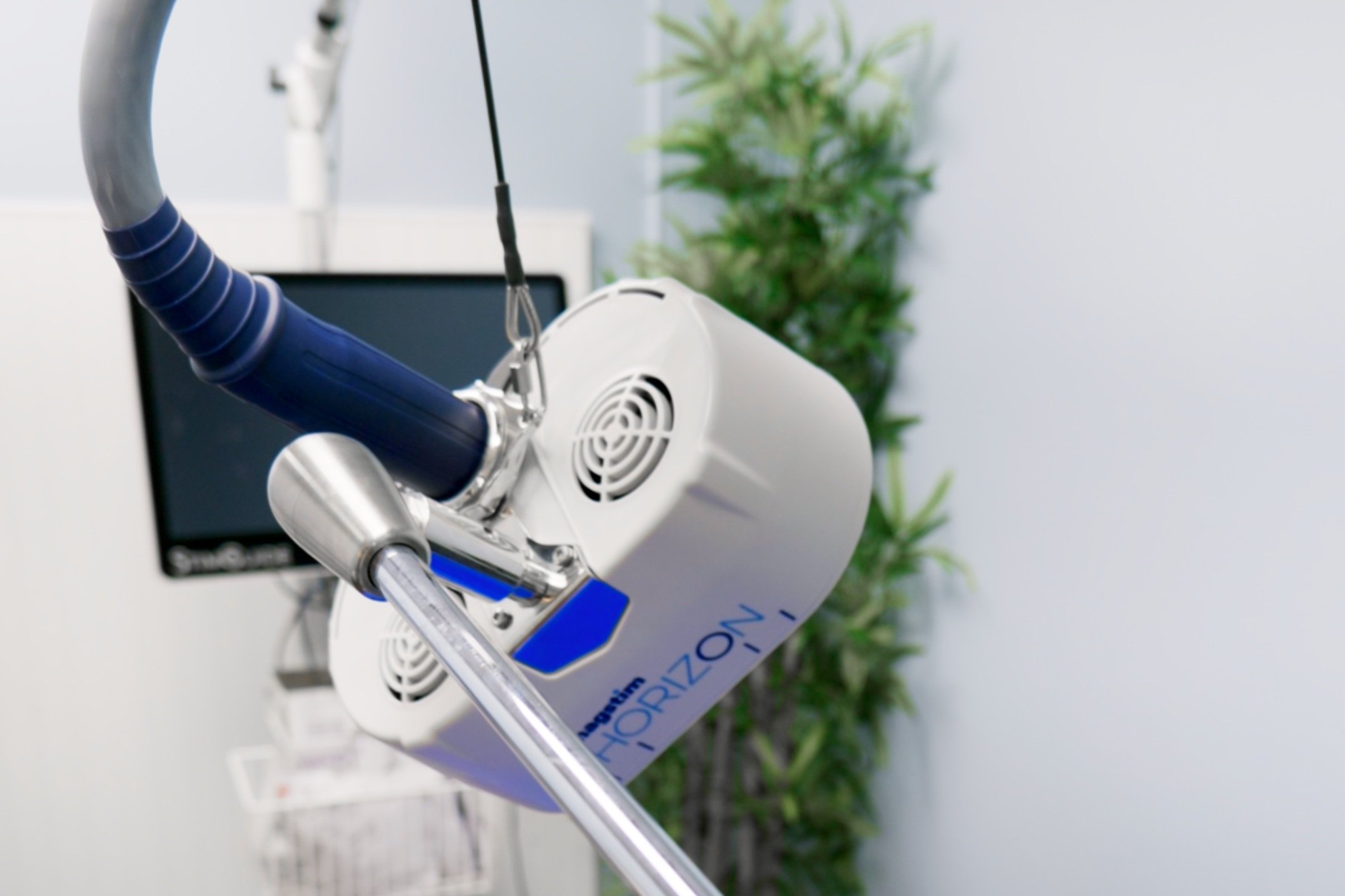
Enhance Emotional & Cognitive Health with TMS
Transcranial Magnetic Stimulation (TMS) therapy is a non-invasive treatment that uses magnetic fields to stimulate nerve cells in the brain, primarily targeting areas involved in mood regulation. TMS is primarily utilized for treating major depressive disorder and can be an effective alternative for patients who have not responded to traditional therapies, such as medication or psychotherapy. Revolutionary treatments are available close to home in Dayton!
What is TMS?
Transcranial magnetic stimulation (TMS) is a non-invasive procedure that uses magnetic fields to stimulate nerve cells in the brain to improve symptoms of MDD and other conditions. TMS is FDA Approved for depression, and can be used off label for a variety of brain disorders. By targeting key brain regions, TMS gently influences electrical activity, potentially reshaping pathways for better emotional and cognitive health.
How TMS Works
TMS requires treatment 5 days a week (there are some off-label options to decrease the weekly amount). During a TMS session, an electromagnetic coil is placed against your scalp near your forehead. The electromagnet delivers a painless magnetic pulse that stimulates nerve cells in the region of your brain involved in mood control. It's thought to activate regions of the brain that have decreased activity.
Cost?
Good News! Most insurance companies will cover TMS. Out of pocket it will cost about $6-12,000
TMS can help those who struggle with
FDA APPROVED
Depression- Treatment for Depression is FDA approved and, typically is used for treatment-resistant depression. TMS works without the need for drugs, and the effects are rapid, working in days rather than months.
Obsessive Compulsive Disorder (OCD)- Common patterns or behaviors characterize OCD or obsessive-compulsive disorder. Medication is not always effective and may have significant side effects. OCD treatment with TMS is an off-label use, but on the other hand, can be more effective without the side effects of medication.
OFF-LABEL TREATMENTS
Post Traumatic Stress Disorder (PTSD)- Post-Traumatic Stress Disorder (PTSD) is more common than previously known. PTSD Treatment with TMS is considered off-label use and responds rapidly when compared to medication, and unlike medication, does not have a high side-effect profile.
Bi-Polar Disorder Type 1 and 2 (BPD)- Mood Disorders, sometimes called Bipolar 1 or Bipolar 2 are quite common. TMS boasts improved cognition over medication in both types of bipolar disorders. This is an off-label use, and many individuals are having a great response from treatment.
Adult Attention Deficit Hyperactivity Disorder (ADHD)- ADHD or ADD is a condition that interferes with concentration and distractibility. It frequently responds to medication, but these are often controlled substances which make their use difficult in many settings such as school and sports.
Anxiety Disorder- Anxiety is usually a joint presentation. Unfortunately, medications used for this condition are for short-term use due to the addictive nature of medication and the likelihood of abuse. TMS has a significant advantage here in that it is not addictive and not a controlled substance with its attendant restrictions, making TMS an ideal choice for treatment.
What to Expect
For an initial TMS session this is what is called “mapping”. Brain mapping is how our provider finds the hotspot point in the brain and finds the lowest stimulator output level that provides a clean EMG response for treatment.
After the mapping process which takes about 30 minutes, we may proceed to their first treatment. During a TMS session, you'll sit comfortably while a magnetic coil is positioned against your scalp. Your provider may give you earplugs so you can relax. The coil emits magnetic pulses that stimulate nerve cells in the brain. You might feel a tapping sensation on your head as the pulses are delivered, but the procedure is generally well-tolerated.
Each session typically lasts between 30 to 40 minutes, and treatments are usually administered daily, five days a week, over the course of several weeks. Most people experience only mild side effects, such as a headache or scalp tenderness, which tend to diminish with continued treatment.
After each session, you can immediately return to your regular activities, as there’s no downtime required.

Restrictions
Medical History: People with a history of epilepsy or seizures cannot undergo TMS.
Current Medications: Those taking stimulants are not eligible.
Metal Implants in the Head: Individuals with metal implants in their head, such as cochlear implants, stents, facial tattoos with metal ink, or permanent piercings, are ineligible.
Metallic Objects Near the Head:
General Metal Implants: TMS is not safe for patients with conductive, ferromagnetic, or magnetic-sensitive metals in their head or within 30 cm of the treatment area. This includes active or inactive implants, like deep brain stimulators and cochlear implants.
Implants Controlled by Body Signals: Patients with devices controlled by physiological signals, like pacemakers, ICDs, or vagus nerve stimulators, should not undergo TMS, even if the devices are outside the 30 cm range. This also applies to those using wearable cardioverter defibrillators (WCDs).
Other Implants: Devices outside the 30 cm range that are not controlled by physiological signals, such as sutures or insulin pumps, are generally safe. If you have this, let your TMS tech.
Wearable or Removable Devices: Patients should remove any wearable or removable devices that could be affected by the magnetic field, like earrings, hearing aids, eyeglasses, or cell phones, to avoid injury or device damage. This also includes wearable monitors and bone growth stimulators.